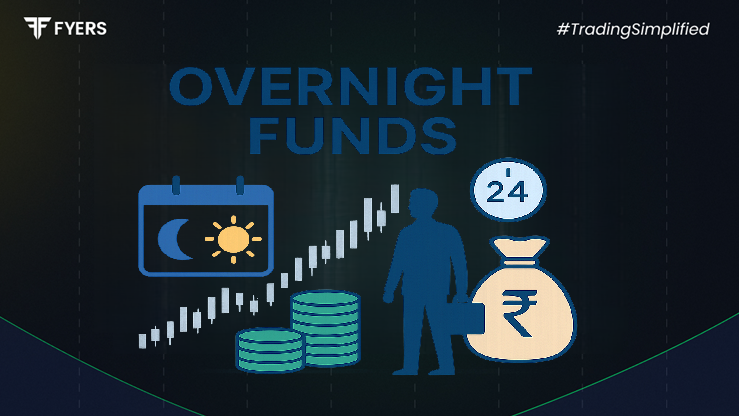

 19 Sep, 2025
19 Sep, 2025
 3 mins read
3 mins read

Investors often look for safe places to park money for very short durations. That’s where an overnight fund comes in. These debt mutual funds invest in securities that mature within a single day, making them among the lowest-risk investment options in the market.
Let’s explore what they are, how they work, their benefits, risks, taxation, and whether they’re right for you.
An overnight mutual fund is a debt scheme that invests in securities with just one-day maturity. This means the portfolio resets daily, reducing the risk of interest rate fluctuations and credit defaults.
These daily maturity funds are often used by investors and institutions to park surplus cash securely for a short time.
Tenure: Invests in securities maturing in one day.
Low risk: Minimal exposure to credit and interest rate risk.
Liquidity: Easy redemption, making them a good choice for short-term parking.
Returns: Modest but predictable, slightly better than a savings account.
Capital safety: Since the securities mature within 24 hours, the risk of default is very low.
Flexibility: Investors can park funds even for a single day.
Better returns than savings accounts: While not high, these overnight debt funds usually offer slightly higher yields than a bank savings account.
No exit load: Most schemes allow easy withdrawals without penalties.
Although considered safe, ultra-short maturity funds come with certain limitations:
Low returns: Gains are modest compared to longer-term debt or equity funds.
Not for wealth creation: Suitable only for short-term cash management.
Reinvestment risk: Returns depend on daily reinvestment rates, which may vary.
Typically, overnight mutual fund returns range from 3% to 5% annually depending on interest rates and market conditions. These are not meant to beat inflation but to provide safety and liquidity.
Since these schemes fall under debt mutual funds, taxation follows debt fund rules:
Short-term gains (less than 3 years): Taxed as per your income tax slab.
Long-term gains (3+ years): Taxed at 20% with indexation benefits.
These one-day debt funds are ideal for:
Investors with idle cash for a few days or weeks.
Risk-averse individuals seeking safer alternatives to savings accounts.
Corporates or institutions parking large sums temporarily.
While both categories provide short-term parking, overnight debt schemes invest in one-day maturity instruments, whereas liquid funds invest in securities with maturities up to 91 days. This makes overnight options safer but with lower returns compared to liquid funds.
An overnight fund is best suited for investors looking for safety, liquidity, and short-term cash management rather than high returns. By investing in instruments that mature in just one day, these daily maturity schemes offer stability and convenience, making them an essential part of short-term financial planning.
It’s a debt mutual fund that invests in securities maturing in one day, offering safe and quick returns.
Yes, they carry minimal risk since the investments reset daily.
Generally, between 3%–5% annually depending on interest rates.
Yes, retail investors, HNIs, and institutions can invest through AMCs or online platforms.
Calculate your Net P&L after deducting all the charges like Tax, Brokerage, etc.
Find your required margin.
Calculate the average price you paid for a stock and determine your total cost.
Estimate your investment growth. Calculate potential returns on one-time investments.
Forecast your investment returns. Understand potential growth with regular contributions.